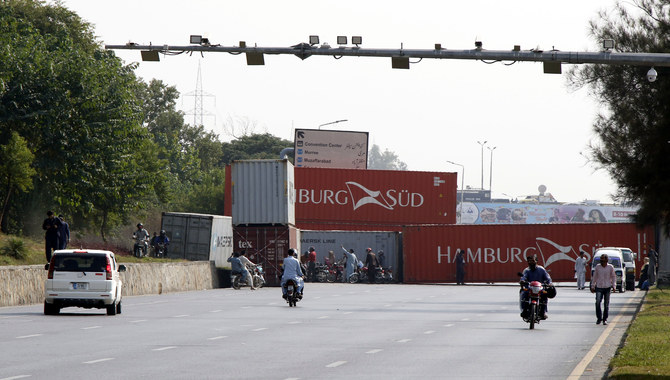LAHORE: Elsewhere in the world they are used to store and transport goods from one place to another.
But not in Pakistan.
It’s here that container trucks take on a completely new meaning when they are deployed to block roads during demonstrations or as temporary homes for politicians during the “season of protests.”
“In Pakistan, containers have three roles to play — as a stage to address the audience, providing housing facility to the leader and to block roads. The use is ... nearly two decades old,” Arif Nizami, President Council of Pakistan Newspapers Editors (CPNE), told Arab News.
Up until the 80s, politicians used to travel in trucks when campaigning for elections, often headed by the leader with his comrades and other senior officials in tow.
Prior to this, law enforcement agencies would use barricades or human shields to stop protesters from crossing the “danger line,” but it wasn’t enough to deter mobs.
It was former Prime Minister Benazir Bhutto who first used a container to stop protesters from entering Islamabad in July 1996.

This file photo taken on Oct. 1, 2019, shows transportation containers blocking thoroughfares in Islamabad. (AN photo by Suhail Shazad)
It was one among several measures used to stop the-then Jamaat-i-Islami chief, Qazi Hussain Ahmad, who was trying to gain access to the capital.
At the time, the entry and exit points of all cities, including Islamabad, had been cordoned off but Qazi managed to enter the city with a few of his followers nevertheless.
A few months later, on November 4, 1996, Bhutto’s government was dismissed by President Farooq Leghari.
It wasn’t until 2014 that containers made a huge comeback with current Prime Minister Imran Khan leading a massive crowd toward Islamabad’s red zone, perched high atop one of the huge metal boxes.
He was, however, restricted by then Interior Minister Ch. Nisar who ordered for the protesters to be denied entry.
Besides demonstrations, the containers were also used for safety purposes, with Bhutto leading the innovation upon her return from Dubai, UAE in 2007 when there was a threat to her life.
The attackers, however, succeeded in getting past the trailer resulting in the death of dozens of people. Bhutto survived the attack.
Taking it a step further, in 2013, Allama Tahirul Qadri of Pakistan Awami Tehreek, used a specially-constructed bullet proof container to topple the Pakistan People’s Party (PPP) government. Qadri’s luxurious container housed a bathroom, study room and a separate meeting room.
A year later, Khan – while leading a movement against then premier Nawaz Sharif – used a container at a cost of Rs12 million, leading political pundits to coin the phrase “container politics.”

This file photo taken on Oct. 1, 2019, shows transportation containers blocking thoroughfares in Islamabad. (AN photo by Suhail Shazad)
Fast forward to today, a luxurious version of the container is once again being used by Maulana Fazl Ur Rehman of the Jamiat-e-Ulama-e-Islam as part of his anti-government drive, with the authorities using the boxes to seal the federal capital, too.
“In the past, nothing has come out from this container politics, nor will it come now. The leadership should use the process of dialogue to find a solution of the political issues instead of using containers for ‘moving the political wheels’ and stopping the protesters,” Ch. Khadim Hussain, Editor, Political Affairs daily Pakistan told Arab News.
Traders and businessmen, for their part, expressed concern over the use of containers impacting the bottom line.
“Lahore Chamber of Commerce and Industry expresses concern on taking the containers in custody as it will badly damage the import of goods in the country,” M Hassam, LCCI Vice Chairman said.
Meanwhile, the Islamabad High Court ordered the government on Thursday not to seize loaded containers to block roads and regulate the movement of protesters in the city.
However, it allowed the administration to use empty containers, if required, after paying suitable compensation to their owners.
















